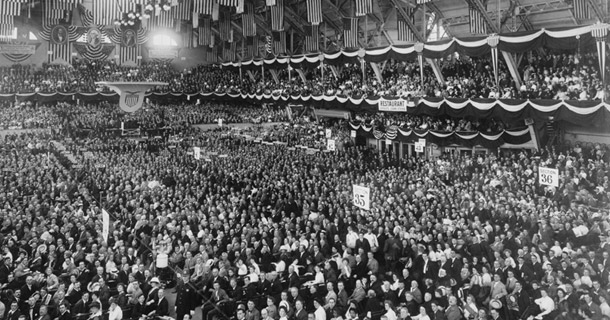 |
| U.S. Progressivism |
The progressive movement is best viewed as a series of shifting coalitions motivated by the problems caused by rapid industrialization in the United States. The composition of these coalitions varied on federal and state levels and from region to region, and progressive reform was not specifically connected to either of the major political parties.
What distinguished progressive reform was the movement's belief in the importance of professional expertise. Progressives understood that government could be an agent of positive change, believed that environment is the key to social behavior, and relied on statistics to support their causes.
Progressive reform was initially directed toward the problems of urban life. The growth of the suburbs took the wealthy away from the cities, which were increasingly populated by people who in many cases spoke a different language and proved impervious to Protestant conversion efforts. Reform efforts were geographically centered in the cities of the East, Midwest, and West and attracted support from agrarian Midwesterners and the moderate wing of southern populism.
  |
Progressive reformers were inspired by thoughts of cultural nationalism and the perfectibility of society. They accepted industrialism but were critical of its oppressive aspects. The movement was publicized by a group of journalists termed the muckrakers, a group of moderate men and women who exposed problems caused by industrial capitalism but did not intend to propose radical remedies for the problems they exposed.
Politically, progressivism occupied the center of the U.S. political spectrum. At the state level, governors like Robert LaFollette of Wisconsin and Hiram Johnson of California were able to implement reforms that placed democracy in the hands of the people and took it away from corporations that appeared to control state politics.
Progressives urged the use of and in many states passed laws that adopted the secret ballot and implemented direct primaries, the initiative, referendums, recalls of elected officials, and direct election of senators.
They also formed commissions to regulate utilities and railroads; they restricted lobbying and raised corporate taxes. To correct the worst features of industrialization, progressives advocated worker compensation, child labor laws, minimum wage and maximum hours legislation, and widows' pensions.
Progressivism entered national politics via the presidency of Theodore Roosevelt, who became president after the assassination of William McKinley in 1900. He was conservative in outlook but feared the excessive power of corporate wealth and the danger of working-class radicalism.
He became the undisputed spokesman for national progressivism. Roosevelt gained a reputation as a "trustbuster" when in 1904 the Supreme Court ruled that Northern Securities Company had violated the Sherman Anti-Trust Act.
In 1903 Congress created the Bureau of Corporations, housed in the Department of Commerce, to publicize and investigate the behavior of giant companies. In 1906 Roosevelt signed both the Pure Food and Drug Act, which empowered the Department of Agriculture to fine and imprison producers found selling adulterated or misbranded goods, and the Meat Inspection Act, which sent federal inspectors into packinghouses to prevent bad meat from coming to market.
Roosevelt's successor, William Howard Taft, was unable to hold the progressive and the conservative wings of the Republican Party together, leading Roosevelt to run as the presidential candidate of the Progressive Party, or Bull Moose Party, in 1912. Both Roosevelt and Taft lost to Democrat Woodrow Wilson, who himself was sympathetic to progressive reform.
Wilson signed the Federal Reserve Act of 1913, which reorganized the monetary system of the country, and in 1914 he signed both the Clayton Antitrust Act and the Federal Trade Commission Act, which strengthened government's ability to regulate corporations. In 1916 Wilson signed the Keating-Owen Act, which prohibited the sale of products made using child labor.
Progressivism also had a religious aspect, known as the Social Gospel, an attempt by mainstream Protestantism to restore some of its lost authority and social prestige through a sort of secular leadership.
It hinged on the belief that every Christian had a dual obligation to self and to society and combined a critique of individualism with a commitment to social justice and reform. This was significant because by the beginning of the 20th century, many Americans looked to science rather than to faith for expertise on problems of the day.
World War I redirected the energy of progressive reformers, and the Republican administrations of the 1920s had no interest in reviving the movement. Its reforms persisted into the 21st century, but many of the social initiatives favored by progressives were not enacted until the New Deal.